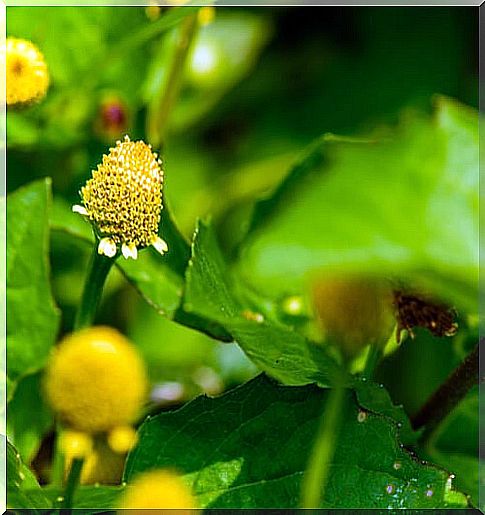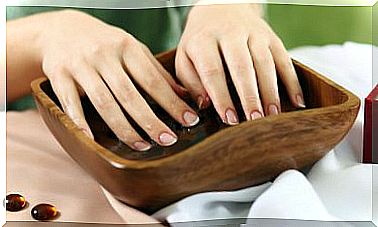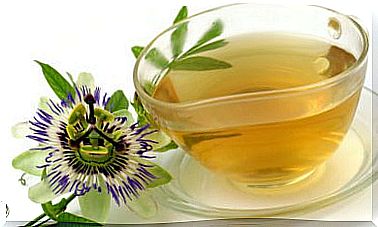Toothache: Ally Against Toothache
In addition to relieving toothache, toothbrush can also help with stomatitis and reduce dry mouth. In this space we detail other benefits of this plant.

Tooth grass or Acmella oleracea is a fast-growing plant native to Brazil and Peru. It is characterized by having a cluster of many tiny yellow flowers that adopt a rounded shape with red spots in the center.
Traditional medicine has used this plant for the health benefits attributed to it. Also, many of these have been studied by science, such as toothache relief. Its effectiveness in treating gastrointestinal problems and inflammation was also evaluated.
It is important to know that tooth grass can be added to food. Its strong and bitter taste brings a unique taste to food. What are its benefits, culinary uses, and possible side effects? We show them to you in this space.
Benefits attributed to it
Given its different applications in folk medicine, it is not surprising that Acmella oleracea is the object of research that seeks to unravel its effects against some diseases and ailments. Let’s see in detail.
1. Relieves toothache
As its name implies, this plant is known for treating pain and inflammation symptoms in the teeth. This is because when chewed, Acmella oleracea has a numbing effect in the mouth.
A review published in the EXCLI Journal showed that spilanthol, an important active ingredient in this herb, is responsible for this anesthetic effect. In the same way, it is a source of flavonoids, a series of natural compounds capable of reducing prostaglandins, associated with the perception of pain.

2. Can help treat stomatitis
Stomatitis is a condition characterized by inflamed mouth and lips. It can also cause painful sores and ulcers that make eating or drinking difficult.
As we have said, the spilanthol present in the herb of the teeth can be of great help. According to a study published in the Journal of Agricultural and Food Chemistry , this active principle reduces the effects of the enzymes that are responsible for inflammation. However, more research is still needed.
3. It can control some symptoms of dermatitis
Dermatitis is a skin disorder that manifests itself as dry, itchy skin or a rash with red, swollen skin. Now, the anti-inflammatory properties of Acmella oleracea can alleviate the symptoms of this condition.
Research published in the International Journal of Molecular Sciences found that spilanthol is capable of inhibiting the migration of inflammatory cells, which creates an effect that can reduce skin swelling caused by dermatitis.
4. It is a natural diuretic
Diuretics allow the body to excrete excess fluid in the urine. According to a study published in PLoS One , spilanthol can increase urine production by directing the cellular activities of the kidneys that produce urine and reabsorb water.
5. Reduces dry mouth
Dry mouth or xerostomia occurs when the salivary glands do not produce enough saliva, which can cause bad breath and the lips to appear dry and chapped. Fortunately, the bitter taste that characterizes spilanthol can reduce these effects by stimulating the salivary glands.
A study published in the Journal of Opioid Management even showed that spilanthol toothpicks are capable of increasing salivation in those with signs of dry mouth.
6. Helps to address gastric ulcers
According to research published in PLoS One , tooth grass can be used as an adjuvant for gastric ulcers, thanks to the fact that it contains a complex polysaccharide or carbohydrate that goes by the name of rhamnogalacturonan or RGal . RGal is known to increase cell growth and reduce inflammation.
Dosage and recommendations of the herb of the teeth
In general, the Acmella oleracea is considered safe to consume plant. However, it is recommended to consult a doctor before including it in the diet.
As for the doses, you must take into account its different presentations:
- If you are making a tea, add a tablespoon of this herb to a cup of boiling water and allow the extraction process to run for 25 minutes.
- If you bought a liquid extract, you can add 10 to 60 drops in a glass of water, 1 to 4 times a day.
- In case of being any other commercial product that contains this plant, follow the instructions suggested by the manufacturer.

Culinary uses of tooth grass
Toothbrush is not only a medicinal plant, but it can also become the main ingredient in many recipes. Since all parts of this herb are edible, you can enjoy them in different ways, whether raw, cooked, dried or powdered.
Its use is common in salads. Small amounts of fresh chopped leaves are added to provide a special flavor. However, keep in mind that cooking the leaves makes them lose their strong and bitter flavor, so if you prepare them in this way you can use them like any other vegetable.
The fresh and boiled leaves are also added to soups and stews. These are usually combined with chili and garlic for a greater taste and contribution of vitamins. On the other hand, in India, the flower buds of Acmella oleracea are used as one of the flavorings of chewing tobacco.
The herb of the teeth is natural medicine and culinary ingredient
The Acmella oleracea , also known as tooth grass is a plant native to Brazil and Peru flowers. Although it grows fast, it only grows in temperate climates, given its sensitivity to cold and frost.
This plant stands out in traditional medicine for its large number of benefits. In general, the herb of the teeth is able to relieve toothache, reduce the inflammation of stomatitis and control the symptoms of dermatitis.
In addition, it serves as a special ingredient in salads, soups and stews. Cooking its leaves reduces its strong flavor, so you can use it like other leafy vegetables, add it to your dishes and enjoy its nutrients and benefits.








